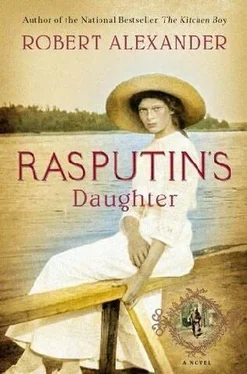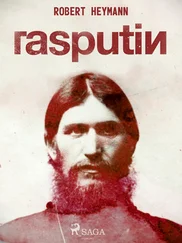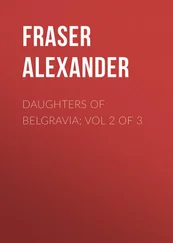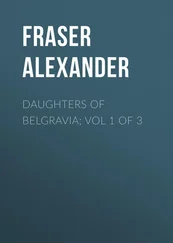“But, Elena Borisovna, is this simply all a game for Grand Duke Dmitri and Prince Felix? Are they merely playing with an innocent peasant, seeing what they can make him do or what they can get out of him?”
“Absolutely not,” she said, quite sternly. “Please, the dangers are very real. Everyone knows the country is about to boil over. There’s talk of nothing else, and I have no reason to doubt it. In more than one salon, I’ve heard that the grand dukes have formed a cabal intent not only on killing your father, but…but on kidnapping the Empress and banishing her to a monastery in Siberia.”
“Bozhe moi,” I said, quickly crossing myself.
“There’s worse.” She hesitated, clearly afraid of the treasonous words that were about to pass her lips. “They talk of deposing the Emperor himself and crowning the little Heir Tsarevich, with one of the grand dukes as regent.”
I couldn’t imagine such treachery and deception in any family, let alone our royal one, and I quickly crossed myself yet again and again and again. Was this how low Russia had fallen, that to preserve its power the House of Romanov felt it necessary to obliterate a mere peasant?
“Please, child, I beg you, pass these words to your father and see that he passes them to the very highest personages,” continued Elena Borisovna, obviously referring to the Tsar and Tsaritsa. “And remember: Once an angry tiger is released from its cage and tastes fresh blood, it’s almost impossible to recapture it. Instead, the beast prefers a knife to its heart.”
She took my hand in hers and kissed it, then spread her scarf over her head and headed out the door. Just before she disappeared, she turned back with a sorrowful smile.
“God bless you and yours, child, for I doubt we shall meet again.”
I stood there barely able to move. The Empress locked away in some distant monastery? The Emperor dethroned and perhaps-dare I even think it-executed? It was too hard to imagine such heinous events in such modern days. After all, this was not a drama of Shakespeare and we were not living in ancient Muscovia, where tsars killed their own sons and disdained wives were thrown to the wolves.
However, if all this came to pass, if the frail Heir Tsarevich were placed on the throne, who would rule as regent, one of the Tsar’s uncles, those towering, aged men now in their sixties and seventies? No, in these days of turmoil and war, the common people wouldn’t accept that. An ancient Romanov, one of the brothers of Aleksander III, would mean a complete return to autocracy and authoritarianism. If that were to happen, there was no doubt in my mind that a regent like that, one of the “dread uncles,” as they were commonly known, would ignite revolution.
Another possibility might be the Tsar’s younger brother, Grand Duke Mikhail. And yet while he might be acceptable to the people, he wouldn’t be to the Romanov clan, because he had married morganatically-breaking strict family laws, he’d not taken a bride from another royal house. Worse still, he’d not even wed a woman of title but rather a mere commoner, the divorced wife of a cavalry captain.
So who would be an acceptable regent? It would have to be someone young, someone who could offer hope to the Russian people and symbolized a promising, progressive future. But who was that? Who could the powerful Romanov uncles control and dominate, even manipulate?
Of course: none other than the young and dashing Grand Duke Dmitri Pavlovich, who suffered from such horrible “grammatical errors.”
Which one of us, I thought standing in that freezing room, was a greater fool, my father or me? Just last month, a treacherous speech had been made at the Duma, and my father had not only brushed it away like an annoying hornet, he had persuaded me to do so as well.
“There’s no need for me to hear it!” Papa had insisted.
“But, Papa, listen!”
“The only thing to the right of Purishkevich is the wall!”
Copies of this speech made by the notorious monarchist Vladimir Purishkevich were already all over town, and it came as no surprise that one had been slipped beneath our door. My voice trembling as much as my hands, I stood in my father’s study, reading aloud.
“‘The disorganization of the rear is without doubt being manipulated by the enemy, and it is being accomplished by a strong, relentless hand. I take here the freedom to say that this evil springs from the Dark Forces, from those who push into high places people who are not worthy or capable of filling them. And these influences are headed by Grishka Rasputin!’”
“Lies!” shouted my father, pounding on the table. “Nothing but lies!”
I continued reading.
“‘These last nights I could find no sleep, I tell you in honesty. I lay in bed with eyes wide open and saw a series of telegrams and notes which this illiterate peasant writes, first to one minister, next another, and finally, frequently, to Aleksander Protopopov, demanding that his actions be fulfilled.’”
“Evil dogs!” snapped my father. “Black evil dogs! No more reading, daughter of mine. That’s it. Enough! I will hear no more!”
“But, Papa, listen!” I begged as my eyes flew to the last lines. “Listen to this:
‘The Tsar’s ministers have been turned into marionettes, marionettes whose strings have been taken confidently in hand by Rasputin, whose house and home have been infiltrated with German spies and by the Empress Aleksandra Fyodorovna-the evil genius of Russia and her Tsar-who remains a German on the throne, foreign to country and people!’”
“Enough, I tell you!” shouted my father, grabbing the speech from my hand and ripping it to pieces. “It’s nothing but lies! No one will pay attention to this…this Purishkevich! How dare he speak of the Tsaritsa like that! In fact, it’s treason. No doubt about it, he will be in jail by tomorrow! Now forget it!”
I took a deep breath. Was Papa right? Were these just the rantings of a fanatic? They had to be because the speech was just that: unequivocally treasonous.
“Everyone knows how terrible this Purishkevich is,” continued my father. “Why…why, he’s part of the Black Hundreds, and just look at what they did to the Jews! The pogroms!”
“I’m so worried, Papa-”
“Nonsense. Just hornets, mettlesome hornets! If you aren’t used to it, even kasha is bitter. Now take a piece of paper and write this down. I want to send a telegram to the Tsar at the front.”
My hands still shaking, I snatched a piece of paper and pencil.
“19 NOVEMBER 1916,” dictated Papa. “god gives you strength. yours is victory and yours is the ship. no one else has authority to board it. Do you have that down, Maria, just as I’ve told you?”
“Absolutely.”
“Good. Now go and see that it is sent. And then forget it. Forget all about that stupid little man’s stupid little speech.”
Now, waiting for the old man with the milky eyes to escort me out of the Sergeeivski Palace, I started shuddering violently. At the time, Papa had persuaded me to dismiss the speech, but I no longer could do so. All too easily I could imagine the entire scene: the fury of Purishkevich’s rhetoric, and the cries of Bravo!, A disgrace!, and How true! that were said to have erupted from the other Duma members.
Fearful of spending any more time in the grand duke’s palace, I finally opened the door and stepped into the dark corridor. But which way should I go, right or left? Better yet, I thought, as my eyes searched the low vaulted passage, which was the quickest way out?
I turned right and immediately felt a fine silky veil over my face and entire head. I cried out and grabbed the strands of a spiderweb from my cheeks and hair. Feeling a creature crawl up my neck, I nervously swiped at something, and a spider, large and black, fell to the floor. Wasting no time, I ceremoniously stomped on it with my leather boot.
Читать дальше












